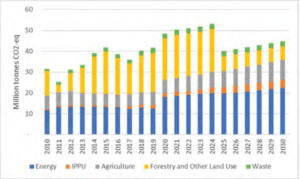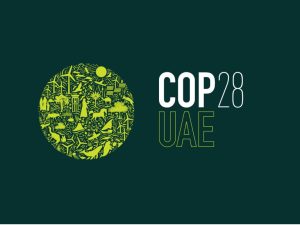

IN two weeks, world leaders will convene in Dubai, the United Arab Emirates, for the 28th session of the Conference of Parties, otherwise known as COP28.
The annual event is a gathering of representatives from countries that have signed the United Nations Framework Convention on Climate Change (UNFCCC) treaty aimed at addressing global warming and reducing greenhouse gas emissions.
COP28 is a platform to discuss and negotiate ways to address climate change. 154 countries, Zimbabwe included, signed the UNFCCC in June 1992, agreeing to combat harmful human impacts on the climate.

Total greenhouse gas emission projections from 2010 to 2030 in the Zim updated mitigation scenario
Zimbabwe has committed to reducing its emissions by 40 percent by 2030 across all sectors in its Nationally Determined Contribution (NDC). The southern African nation contributes less than 0,1 percent of the global greenhouse gas emissions causing climate change.
Despite the current small contribution, Zimbabwe has seen increased frequency and magnitude of prolonged dry spells, droughts, tropical cyclones, and violent storms over the past two decades.
Environment and Climate minister Mangaliso Ndlovu is expected to lead the Zimbabwean delegation to the emirates and his ministry has five key issues to push during COP28.
Loss and damage fund
The loss and damage fund agreed at COP27 is an agreement to provide funding for vulnerable countries hit hard by climate disasters.
The blueprint must be formally adopted at COP28. The ministry of Environment and Climate, Zimbabwe places it highly and expects action at the UN climate summit.
The United Nations Conference on Trade and Development (UNCTAD) says at COP28, parties have the opportunity to address the glaring gap in loss and damage support and get it right.
“The time taken to ensure that institutional arrangements and resourcing are fit for purpose will be well worth the boost to trust, global stability and climate-resilient development,” UNCTAD said in a report titled: ‘Taking Responsibility: Towards a Fit for Purpose Loss and Damage Fund’.
The ministry of Climate believes the loss and damage fund can help address the loss of livelihoods, displacement, and food insecurity.
“The loss and damage fund strengthens the implementation of the Paris Agreement for the development of specific strategies and actions to strengthen the implementation of the Paris Agreement, particularly for vulnerable communities. At COP28 it remains an essential and strategic agenda item for the Zimbabwe Group of Negotiators,” the ministry said in its COP28 roadmap.
 Climate finance
Climate finance
Despite making strong commitments to reducing gas emissions, Zimbabwe has missed out on financial pledges made by highly industrialised nations.
An Adaptation Gap Report by the United Nations Environment Programme (UNEP) shows that developing countries require US$387 billion per year until 2030 to adapt to climate impacts.
At COP28, climate finance remains a critical issue under the negotiations, with main discussions centred on developed countries meeting the US$100 billion goal set at COP15.
“Zimbabwe and the African group of nations will continue to call for the need for new, additional, predictable, adequate and non-concessional climate finance from developed countries for climate change mitigation and adaptation in developing countries,” the Climate ministry says.
Daniel Sithole, a climate change expert and founding director at Green Shango Environmental Trust, noted that climate finance should be aligned to the development goals and needs of African countries and support their transition to low-carbon and climate-resilient economies.
“Many African countries face difficulties in accessing and utilising climate finance, due to complex procedures, limited capacities and weak governance, hence the need for strengthening the institutional and technical capacities of African countries to design, implement, and monitor climate projects, as well as improving the transparency and accountability of climate finance flows,” Sithole said.
He said the summit will be an opportunity for African countries to voice their concerns and expectations and to advocate for more ambitious and equitable climate action from the international community.
Adaptation
Zimbabwe is highly vulnerable to the impacts of climate change affecting food security, particularly in rural areas where communities rely on rain-fed agriculture. Changes in rainfall patterns, increased temperatures, and extreme weather events have all led to reduced crop yields, soil degradation, and increased pest and disease pressure.
The southern African nation highlights that implementing adaptation measures that promote climate-resilient agriculture is critical to addressing the impacts of climate change on food security in Zimbabwe. COP28 president-designate, Sultan Ahmed Al Jaber, says the increasing risks and impacts, including those seen this summer, make adaptation a priority for the success of COP28.
Mitigation
At COP28, mitigation aimed at reducing emissions towards 1.5°C by 2030 remains a key priority taking into account different national circumstances.
In Glasgow in 2021, parties decided to establish a work programme to urgently scale up mitigation ambition and implementation, referred to as the Mitigation Work Programme.
This was a recognition that, without full implementation of NDCs already submitted and strengthening climate ambition, the 1.5°C warming limit would be out of reach. Progress in Sharm El-Sheikh was slow due to divergences on such issues as guiding principles, scope and timeline for the process.
“Zimbabwe, having a huge potential for renewable forms of energy, makes this Mitigation Work Programme an issue of interest to pursue at COP28, taking into account that developed countries are obligated under the convention to provide means to developing countries to mitigate with adaptation co-benefits, where possible. The issue of finance should be given precedence as we discuss climate change mitigation,” the COP28 roadmap for Zimbabwe says.
The International Fund for Animal Welfare country director for Zimbabwe, Alleta Nyahuye, said the nature crisis and the climate crisis are rightly recognised as two sides of the same coin.
“By restoring wildlife populations and repopulating our land and ocean with the animals that call these places home, we not only address biodiversity loss but we also have the opportunity to supercharge climate mitigation,” she said.
Just transition
The concept of a just transition recognises that a shift to a more sustainable economy can have significant impacts on workers and communities that are currently dependent on fossil fuels. COP 27 established a work programme on just transition pathways to achieving the goals of the Paris Agreement of reducing temperature rise.
For Zimbabwe, fundamental concerns relating to the just transition include economic losses and the consequent impacts on the workforce that will be redundant thereafter as well as possible value chain disruptions.
“Zimbabwe’s position is to have an agreement on just transition that creates funding opportunities for the Just Transition Work Programme, accessible to developing countries in a transparent and just manner,” the ministry of Climate says.
“Several of our capital assets will be devalued before the end of their economic lifetime, culminating in stranding of these assets. These potential ‘stranded assets’ include coal-fired electricity generation plants, oil fields, to some extent even some natural gas resources.
“It is now almost certain that exploitation of the same will be strongly discouraged in the near future with a possibility of phase-down timelines being unachievable in the short term and may have the potential consequences of derailing our economic development.
“External demand for coal will eventually decline as the share of renewables in the global energy mix increases,” the ministry added.
At COP28, global political leaders are expected to meet and agree on several climate issues, with dialogues and agreements with the private sector, representatives of non-governmental organisations, local communities and indigenous people, women, youths, children and related groups.
newsdesk@fingaz.co.zw